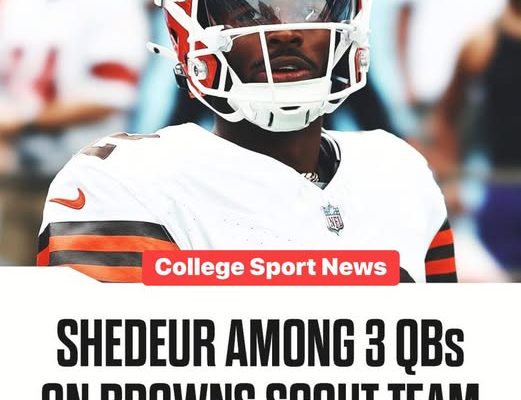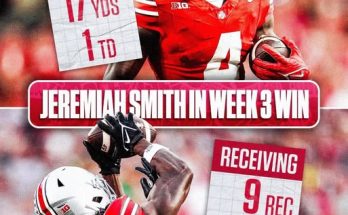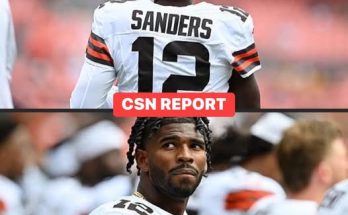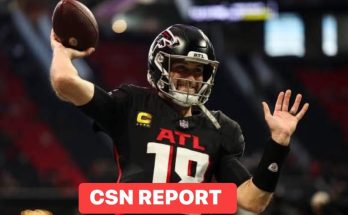According to Browns quarterbacks coach Bill Musgrave, Shedeur Sanders, Dillon Gabriel, and Bailey Zappe are all taking snaps with Cleveland’s scout team, a development that has sparked intrigue across both NFL and college football circles. The Browns are a franchise that has long been defined by their search for stability at quarterback, and every decision related to the position is analyzed heavily by fans and the wider media. What makes this particular scenario interesting is the combination of names involved: Sanders, still widely associated with his collegiate career and the rise of Deion Sanders’ Colorado program; Gabriel, a decorated college passer known for his accuracy and composure; and Zappe, a former New England Patriots quarterback who briefly became a cult hero in Foxborough. The notion that all three are getting work with Cleveland’s scout team paints a picture of a team exploring its options, evaluating talent deeply, and positioning itself for both short-term flexibility and long-term planning.
The Browns are in a unique position. Their starting quarterback situation has been unsettled for several years, with injuries, trades, and inconsistent performances preventing them from establishing a clear long-term leader. For Musgrave, a coach with decades of experience developing quarterbacks at both the professional and collegiate levels, the task is not only about preparing the starter for game day but also about building a pipeline of capable players who can step in when needed. That’s where the scout team snaps become significant. These reps are not simply throwaway practice moments; they’re opportunities to evaluate how young or developing quarterbacks handle live-action simulations, timing, defensive looks, and the rhythm of a pro offense.
Shedeur Sanders is the most eye-catching name on the list. The son of NFL legend and current Colorado head coach Deion Sanders, Shedeur has drawn national attention for his poise, leadership, and productivity at the college level. While some see him as a future franchise quarterback, there has also been skepticism about how his game will translate to the NFL. Having him take snaps with Cleveland’s scout team suggests that the Browns are interested in seeing firsthand how he processes defenses at professional speed. Musgrave’s approach with Sanders appears to be centered on acclimation rather than immediate pressure. By putting him in situations where he can experiment, make mistakes, and adapt, the Browns are essentially giving Sanders a soft landing into the demands of an NFL environment. It also reflects the modern NFL trend of getting early looks at potential draft targets or practice-squad candidates before they fully enter the league.
Dillon Gabriel represents a slightly different case. Known for his prolific career at UCF and later Oklahoma, Gabriel has built a reputation as a cerebral quarterback who can dissect defenses and operate efficiently in spread systems. His inclusion in this scout team rotation may be less about future draft projections and more about immediate utility. Scout team quarterbacks often need to replicate the style of upcoming opponents, and Gabriel’s versatility makes him an excellent candidate for that role. At the same time, it provides him with invaluable experience against NFL defenses. Musgrave has long emphasized the importance of repetition and exposure, and for Gabriel, every snap against Cleveland’s defensive unit—one of the better groups in the league—becomes a learning opportunity. The Browns benefit too, because a smart, accurate quarterback on the scout team can challenge their defense in ways that prepare them better for game day.
Bailey Zappe’s presence adds another layer of intrigue. Unlike Sanders and Gabriel, Zappe has already tasted the NFL spotlight. Drafted by the Patriots, he earned a brief but memorable run as a starter when injuries and poor play at the position created an opening. Zappe impressed some observers with his confidence and decisiveness, though he ultimately fell back down the depth chart. Now with Cleveland, his assignment on the scout team signals both a fresh start and a test of whether his skill set can fit into Musgrave’s system. For Zappe, these reps are critical. He is not merely auditioning for a long-term role with the Browns but also showcasing his resilience and adaptability to the rest of the league. Musgrave’s feedback will matter a great deal; his track record of coaching quarterbacks such as Steve Young, Matt Ryan, and Derek Carr gives his evaluations weight.
For Cleveland, the decision to rotate these three quarterbacks with the scout team underscores their broader strategy. In a league where quarterback injuries are common and depth is vital, it pays to invest time in multiple options. Rather than relying solely on their starter and a traditional backup, the Browns appear intent on creating a developmental ecosystem. Scout team reps may not come with the glamour of prime-time snaps, but they can reveal who has the discipline to learn a playbook, the vision to adjust quickly, and the mental toughness to handle adversity. Musgrave himself has often said that the best way to identify a quarterback’s potential is to watch how he handles chaos, and the scout team—constantly tasked with mimicking opponents—offers plenty of that.
The presence of these three quarterbacks also speaks to Cleveland’s willingness to blur the lines between evaluation and preparation. While the scout team traditionally exists to prepare the defense, it is also becoming a hidden laboratory for testing young talent. Sanders may be viewed as a potential draft target down the line, Gabriel as a depth option or future practice squad player, and Zappe as a reclamation project. Each has different stakes in these sessions, but all are given the chance to show something that could shape their careers. For Sanders, a well-thrown seam route against the Browns’ starting safeties could reinforce his NFL readiness. For Gabriel, accurately mimicking an opposing quarterback could demonstrate his ability to learn and adapt quickly. For Zappe, steady decision-making in high-pressure drills could prove his worth as a reliable backup.
From the Browns’ perspective, there is also a competitive advantage. A scout team quarterback who can simulate the tendencies of upcoming opponents sharpens the defense. Facing someone with Sanders’ mobility, Gabriel’s quick release, or Zappe’s timing helps defenders prepare for the unpredictability of Sundays. Musgrave has emphasized that the value of these reps goes both ways: the quarterbacks gain exposure to NFL speed, and the defense gains a realistic rehearsal against varied skill sets. That symbiotic relationship may explain why Cleveland is willing to rotate three names of this caliber rather than stick with a single developmental quarterback.
Another layer to consider is the cultural and leadership dynamic. Quarterbacks are, by nature, leaders, and even on a scout team, they must command the huddle, earn the respect of teammates, and communicate effectively with coaches. For someone like Sanders, who has grown up in a football family and under intense media scrutiny, this is an opportunity to show that his leadership translates to a professional locker room. Gabriel, who has been praised by college coaches for his maturity, can reinforce that reputation by how he handles the grind of NFL practices. Zappe, who has already experienced the highs and lows of public perception, has a chance to demonstrate humility and resilience. Musgrave is likely paying as much attention to these intangible qualities as he is to footwork and mechanics.
The broader football world will inevitably read into these developments. For college fans, the idea of Shedeur Sanders taking scout team reps with an NFL franchise before declaring for the draft is a fascinating storyline. It raises questions about how seriously Cleveland is scouting him and whether they envision him as part of their long-term future. For NFL watchers, Zappe’s presence is a reminder of how quickly quarterback careers can pivot from opportunity to uncertainty and back again. For those who follow quarterback development closely, Gabriel’s inclusion highlights how even highly productive college passers must grind through developmental reps to prove themselves at the next level. In each case, the scout team becomes more than just a practice squad assignment—it becomes a proving ground.
If Musgrave and the Browns succeed in using these reps effectively, the team could find itself in a much stronger position down the road. Depth at quarterback has often been the difference between playoff teams surviving a long season and falling short. By investing time in Sanders, Gabriel, and Zappe now, Cleveland is buying insurance against the unpredictability of the NFL calendar. At the same time, they may uncover a hidden gem. History has shown that quarterbacks who once seemed destined for obscurity have carved out meaningful careers when given the right coaching and opportunity. Musgrave’s calm, detailed approach could be exactly what one of these three needs to make that leap.
Ultimately, the story of Sanders, Gabriel, and Zappe taking snaps with Cleveland’s scout team reflects the reality of modern quarterback development. The position is too important to leave anything to chance, and teams that think creatively about building depth are often the ones best prepared for the challenges ahead. For now, these reps may not make headlines beyond Musgrave’s remarks, but they represent the kind of behind-the-scenes work that shapes the future of both players and franchises. Whether Sanders eventually becomes a high draft pick, Gabriel works his way into a roster spot, or Zappe revives his career as a dependable backup, all three are benefitting from the chance to learn, compete, and grow in Cleveland. And for the Browns, a team always striving to find its quarterback of tomorrow, this quiet experiment could prove to be one of the smartest moves they make.



